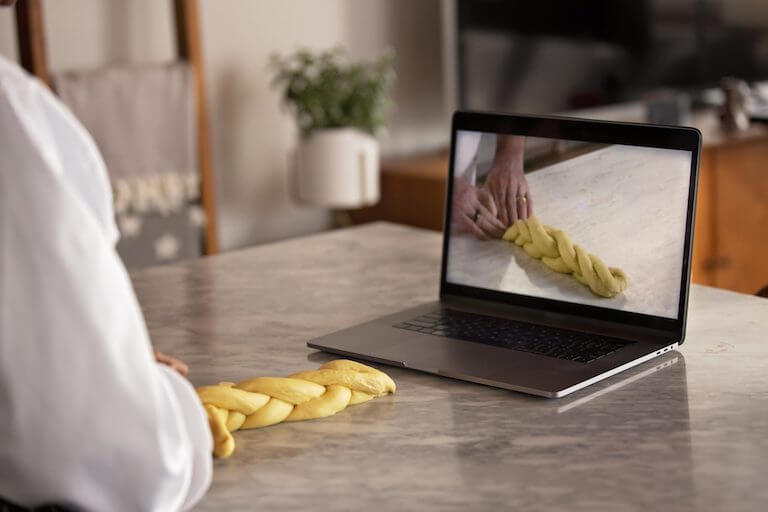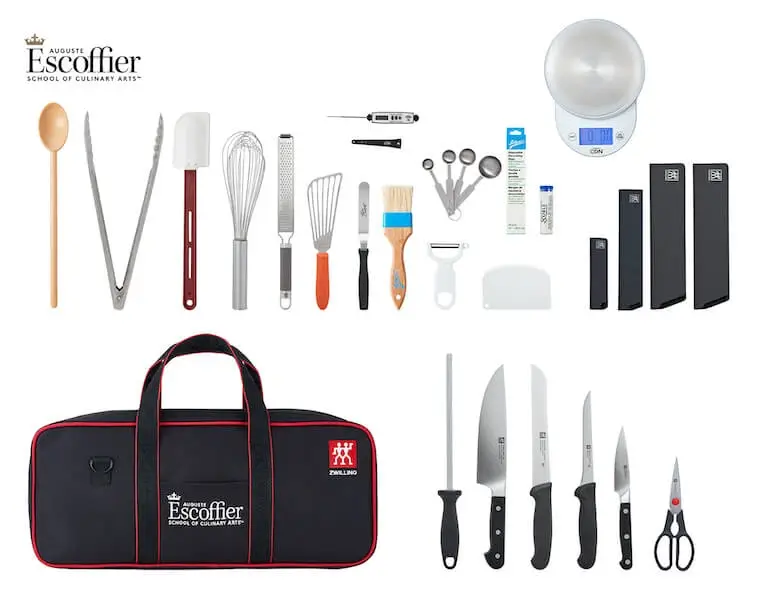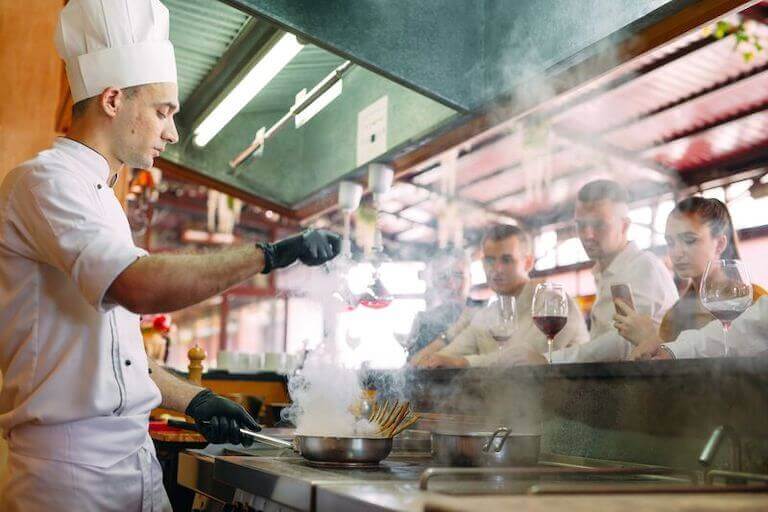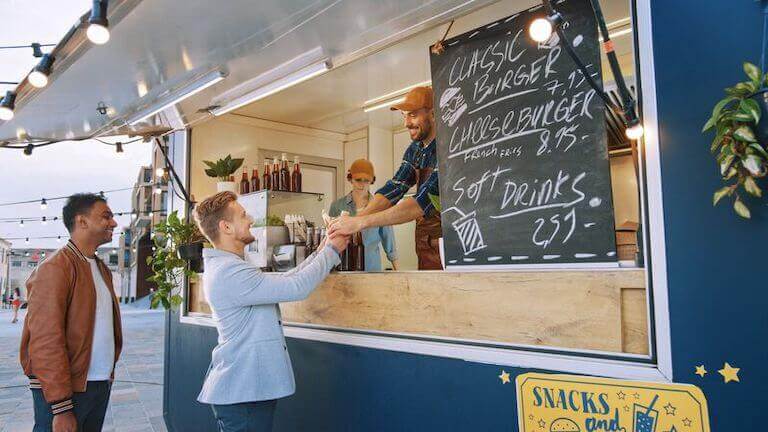Listen to This Article:
Do you dream of going to culinary school but aren’t sure you can make it happen? Maybe you’re a working parent who can’t attend classes during the day, or perhaps you live in a rural area hours away from the nearest culinary campus. Or you might be working full-time and need flexibility to study around your current job schedule.
Online culinary education could offer an alternative path. But can you really practice professional cooking techniques at home? And will you receive comparable instruction to on-campus students?
All of these concerns are common, and online culinary programs have evolved to address them effectively. Continue reading to explore how online culinary education at Escoffier might work for your situation.
How Does Online Culinary School Work?
Online culinary school is more like traditional learning than you might think. Much like in a classroom, online students at Escoffier can complete coursework, receive personalized feedback, attend live sessions, and participate in a hands-on industry externship.
Students Apply Chef-Led Lessons in Their Own Kitchens
Online culinary education at Escoffier is designed for students to feel connected and engaged. You can access online instruction from experienced Chef Instructors with recorded demonstrations and opportunities for real-time Q&A. Join virtual live lessons with your instructor and fellow students each week for a real classroom experience, or review the weekly live session recordings so you never miss a beat; students can review them later or catch up if they miss the live session. Plus, you can interact with other online culinary students and potentially build a nationwide network.
Online courses typically follow a Wednesday through Tuesday weekly format. Students can log in to Escoffier’s ECampus portal from a computer or mobile device to receive their lesson materials, which include live and archived video class sessions, reading assignments, and detailed recipe instructions.
Online lessons are supplemented with reading and video content, and arguably the most important piece—practice! Each week, students complete assignments from their own kitchens, documenting progress with photos and notes.
*Information may not reflect every student’s experience. Results and outcomes may be based on several factors, such as geographical region or previous experience.
Peer Support Can Strengthen the Online Learning Experience
While online culinary education might seem like a solitary experience, many students discover that some of their strongest connections happen outside the virtual classroom. Some online students have formed study groups, connected through group texts, and even traveled across the country to meet up with each other.
These peer connections go beyond standard homework help. Students might share cooking tips, troubleshoot techniques together, and provide encouragement during challenging assignments. Many find that having classmates to text when a recipe isn’t working or someone to celebrate with when a dish turns out perfectly can make the online experience feel more collaborative.
One group of students nicknamed themselves Les Misfits d’Escoffier, forming a friendship that extended well beyond graduation. They’ve traveled to visit one another, attended each other’s restaurant openings, and continue to collaborate professionally even years later.
“These guys are like family right now,” said Luis Rodriguez, one of the group members. “We’ve called each other with different problems, whether they’re personal problems or professional problems. We’ve talked to each other about everything. … We’ve been there to support each other through illnesses, through all kinds of things.”*
*Information may not reflect every student’s experience. Results and outcomes may be based on several factors, such as geographical region or previous experience.
Chef Instructors and Success Coaches Can Provide Personalized Guidance
Students can connect with Chef Instructors and dedicated support staff to work through tricky techniques, talk about career goals, or get guidance on their career path. When assignments don’t turn out as expected, Chef Instructors don’t just assign a grade and move on. They provide specific guidance to help students understand what went wrong and how to improve.
For Geno Vento, an online Culinary Arts graduate, this made all the difference when he was struggling with a brown roux technique.
“If it wasn’t for Chef Leigh, I would have been like, ‘Oh, whatever. I’ll just accept it,’” Vento said. “She just pushed me, and she didn’t tell me to do it; she encouraged me to make me want to do it.”*
*Information may not reflect every student’s experience. Results and outcomes may be based on several factors, such as geographical region or previous experience.
Online students are also paired with Success Coaches who can provide ongoing support. These coaches can help students navigate challenges, stay organized, and connect with additional resources when needed. Whether you’re struggling with time management, need help understanding feedback, or face unexpected life circumstances, your Success Coach can work with you to find solutions.
Students can connect with their Success Coach through video chat, phone, email, or text, whichever fits their schedule best. Success Coaches are your partners in progress — reaching out to help you stay current with attendance and on track to achieve your graduation goals.
Chef Instructors Assess Work Through Photos and Written Analysis
For each assignment, students carefully record their cooking process and describe the flavor profile they are building. They also submit photos, plus an analysis of the taste, texture, and overall outcome of their dish to their instructor.
Chef Instructors then analyze students’ work and may provide personalized feedback and suggestions for improvement, evaluating the outcome of a dish through the information students provide as well as visual cues.
In fact, online students can often become especially well-practiced in culinary communication because they rely on this skill for grading and coaching.

Online students can practice culinary techniques and receive instructor feedback at home.
Courses Balance Set Deadlines with Schedule Flexibility
While a day in the life of an online culinary student varies, you can expect to spend anywhere from 15 to 23 hours per week, depending on your program, credential, and individual pace.
Lectures must be attended (whether live or watching the recording later), and assignments are still due by a deadline, but online students can fit these into their existing schedule. Online students may have the ability to plan ahead of time and complete assignments throughout the week, where they fit best.
Chef Luke Shaffer explains how online students practice hands-on skills at home.
Students Combine School-Supplied Tools with At-Home Resources
For starters, you’ll need WiFi and a device to complete your program. A strong internet connection is important to ensure lectures and online interactions are clear and easy to understand. In addition, online culinary students receive a standard toolkit containing some essential utensils and tools for their specific program, as well as a chef’s uniform complete with a coat, apron, and skull cap.
These toolkits vary based on your program; a Pastry Arts student may receive different materials than a Culinary Arts student would. But both include many of the essentials needed for coursework.
Online students will also need to gather ingredients to complete weekly assignments. Chef Instructors provide online students with a list of ingredients and equipment needed for assignments so students can prepare in advance.

Online culinary students are equipped with a toolkit of culinary essentials.
Hands-On Industry Experience Complements Online Coursework
Just like their peers attending in-person programs, online students must complete one or two hands-on industry externships, depending on their program.
This is the one piece of the online program that cannot be completed in your home kitchen. Online students can work with Escoffier to connect with a foodservice establishment that is both convenient for them and relevant to the skills they are learning.
Externships differ from internships in that they are shorter and more directly focused on the skills each student has been developing. Where online students have previously relied on virtual feedback and training, they can now hone their skills with in-person practice and feedback.

Students can put the skills they’ve learned online into practice during externships.
Online Students Can Complete a Diploma or Associate Degree
Online students may choose between earning a diploma or associate degree in various disciplines.
Diploma programs are typically shorter and can help equip students with the technical skills they may need in the workplace. Associate degree programs dive a bit deeper, equipping students with technical skills as well as the communication and organizational skills they may need to run a food business. Online students can choose from the following disciplines:
- Culinary Arts explores culinary techniques and food preparation methods, and the degree program expands into management and business skills, like how to communicate effectively in the kitchen.
- Pastry Arts students can practice technical skills in the science of baking and pastry, as well as the business skills they may need to open their own bakery.
- Food Entrepreneurship can equip students with the skills to start their own food business, including business planning, food marketing, and other core entrepreneurial abilities.
- Plant-Based Culinary Arts students can discover how to use plant-based ingredients and techniques to promote healthy, sustainable cuisine.
- Holistic Nutrition & Wellness can equip students to create a career in the wellness industry with knowledge in nutrition, mindfulness, and healthy lifestyles.
- Hospitality & Restaurant Operations Management students can explore best business practices to help them prepare for hospitality and management-related careers.

Some online students apply the skills they learn to start their own food business.
Is Online School Cheaper Than In-Person?
At Escoffier, the cost differences between online and traditional programs are moderate. Some students appreciate that online education can save time and money on commuting and parking, and that it rarely demands relocation or a job change.
Regardless, students should consider culinary school an investment that may bring them closer to their personal goals, and remember that online programs require the same level of commitment as in-person options.
And just like on-campus students, online students can take advantage of federal financial aid if they apply and qualify. The Financial Aid department is available to help students identify funding sources and financial aid options available to them.
Find What Fits Your Lifestyle (& Location)
Online culinary school at Escoffier can help remove barriers such as busy schedules, family responsibilities, and even geography. Earning a degree from home makes it possible to study with industry experts at a top-tier culinary school—from almost anywhere.
If you’re curious about a future in food, online culinary school could help you explore that path without stepping away from your current life. It’s a chance to build skills, test your interests, and see where your passion could lead, all from your own kitchen. Contact us to explore how you can earn your culinary degree from home.
CHECK OUT THESE ARTICLES TO LEARN MORE ABOUT YOUR ONLINE CULINARY SCHOOL OPTIONS:
- How Long Does It Take to Get an Online Culinary Arts Degree?
- The Future of Culinary Education Is Here: This Is What It Looks Like
- A Day in the Life of an Online Culinary Student
*Information may not reflect every student’s experience. Results and outcomes may be based on several factors, such as geographical region or previous experience.
**Consider your situation and resources to determine what is affordable and on budget, for you.
This article was originally published on April 24, 2023, and has since been updated.

